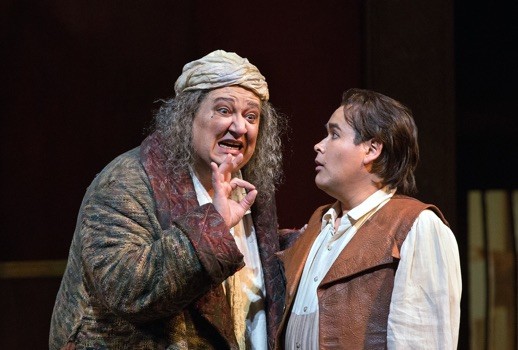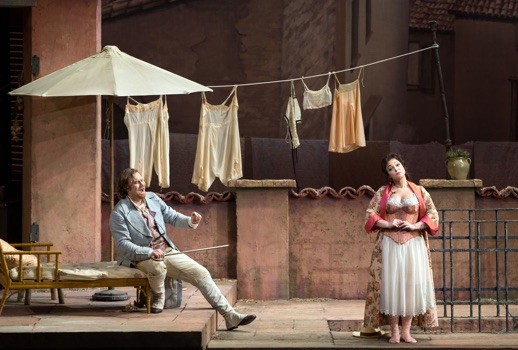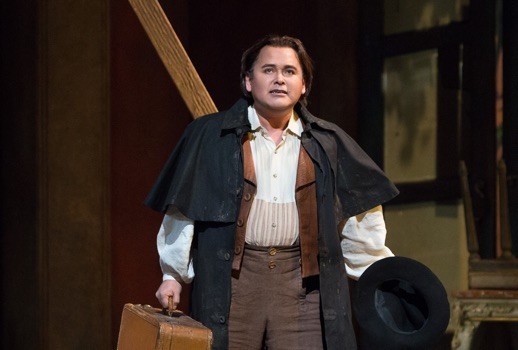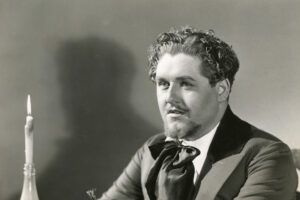

But a game, well-matched quartet of performers, all new to their roles at the Met and led by returning bel canto hero Javier Camarena, successfully held my attention although I sometimes still wanted to avert my gaze.
I attended the 2006 premiere but maybe viewing the show from up in the Family Circle softened its leaden comic business or maybe I was just dazzled by the starry charisma of its cast—Anna Netrebko, Juan Diego Flórez, Mariusz Kwiecien and Simone Alaimo. But 10 years later, revived by J. Knighten Smit, the thin plot to trick a vain miser played out like a bad 1960s sitcom but at least it was served with high-quality Donizetti instead of a raucous laugh-track. Rolf Langenfass’s needlessly elephantine sets required long scene changes which added a good twenty minutes the running time and made the evening less than spumante.
Conductor Maurizio Benini’s oddly mannered overture nearly derailed the performance before it begun. The initial measures were wildly rushed, then later passages were so stretched out that they lost shape. Happily he settled down once the show curtain rose although occasionally stage-pit coordination lapsed and one felt another rehearsal or two might not have been amiss. The chorus which has been sounding fine all season had an off-night and the usually surefire “Servants’s Chorus,” swirling with desperately unfunny hijinks, laid an egg.
Yet a worthy, hard-working cast made the evening surprisingly enjoyable. Ambrogio Maestri delivered a subtle Pasquale akin to his superb Falstaff of several seasons ago. He rose above the desperate Schenk-shenanigans to create a rounded, amusingly ridiculous yet ultimately touching portrait of the old bachelor. Maestri brought a more substantial baritone to the role than one often hears, although he was occasionally covered by Benini. It was too bad then that the tongue-twisting patter in the duet with Malatesta emerged as a chaotic blur.

That scheming minx was portrayed by the engaging Italian soprano Eleonora Buratto in her Met debut, and like Netrebko she was not your traditional coloratura soubrette. Her large warm voice was more secure in the middle than on top, and her florid singing was efficient rather than dazzling. Once past her nervously tentative opening aria, Buratto relaxed and sang with striking verve but harsh high notes that failed to bloom, and her lack of a trill blighted several key moments, although she faked it better at some times than others.
Saddled with stage business that must have worked better for the Russian soprano, the spitfire Buratto twirled and pranced and raged with such scary fervor that she scarcely seemed human. In her duet with Malatesta she threw pillows to the floor again and again—for no reason, and she later distractingly wrestled her unwieldy stole to a draw during her crucial third-act confrontation with Pasquale. The precarious balancing act of any Don Pasquale is how keep Norina sympathetic given her (put-on) shrewish behavior and poor treatment of Pasquale after the faux-marriage.
Despite Schenk’s low burlesque approach, Buratto and Maestri stayed true to the genuine emotions caused by Norina’s shocking slap of Pasquale. Maestri, in particular, movingly underplayed his hurt and dismay while Buratto finally showed there was a heart beneath Norina’s dogged mugging.

After his unheralded break-out smash success two seasons ago in La Sonnambula and La Cenerentola, Camarena as Ernesto was the evening’s most highly awaited feature—and he did not disappoint. In “Sogno soave e casto” the tenor’s open, shining voice throbbed with barely suppressed despair. His superbly plangent second-act aria and cabaletta set off a thunderous ovation punctuated by hopeful calls for a bis—which didn’t happen—at least not this time.
For all the furor over his thrilling interpolated high D and D-flat, his most special quality is the intense emotional candor of his singing, a guileless communication that touches something within his listeners. Both “Com’è gentil” and “Tornami a dir” (with Buratto’s trill-less collaboration) were uncommonly lovely, and Camarena gallantly let his soprano have the finale’s concluding high C all to herself.
The Met’s “all-Donizetti all-the-time” March continues next Thursday with the opening of L’Elisir d’Amore starring Aleksandra Kurzak and Vittorio Grigolo, and the house’s first-ever Roberto Devereux, the final race of Sondra Radvanovsky’s Tudor “triple crown” arrives on the 24th. But there’s even more elsewhere in New York City: both Regina Opera and Heartbeat Opera are staging Lucia di Lammermoor, the latter in an abbreviated, pared-down version, and beginning March 15 Amore Opera presents the first full U.S. production of Poliuto since 1859!
An embarrassment of bel canto riches, but still I was somewhat relieved that no Donizetti appeared in the Met’s 2016-17 season announcement.
Photos by Marty Sohl/Metropolitan Opera.


























Comments